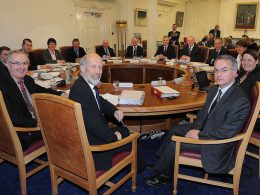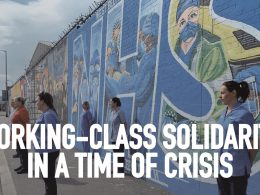Fierce rioting took place in several areas of Belfast and Newtownabbey over the 12th weekend. The rioting began when the PSNI enforced a Parades Commission ruling that an Orange Order parade should not be allowed to pass the Ardoyne shops on its return from the main 12th demonstration.
Over 40 members of the PSNI and many civilians were injured. Water cannons were deployed by the police and dozens of baton rounds were fired. The worst trouble was on Woodvale Road but there was also trouble at the Short Strand / Lower Newtownards Road interface and a brief clash between Catholic youth and marchers in York Street.
The Orange Order had initially called for prolonged protests, suggesting a stand-off on the Woodvale Road lasting for days. Late on the 12th however it suspended protests, probably concerned about the negative publicity arising from the rioting. It is clear that both the UVF and the UDA mobilised young people for the clashes and the situation was spiralling out of the Order’s control. The Order may also have been taken unawares by the robust response of the PSNI, gambling that Secretary of State Teresa Villiers would over-rule the Parades Commission, as she is able to if she is advised by the PSNI that it cannot not hold the line.
Whatever the exact reasons for the banning decision, many Protestants and Catholics believe that the reason was the rioting by Catholic youth at Ardoyne over the last few years. The newly-created, and dissident influenced, umbrella organisation for residents groups will certainly draw the conclusion that confrontation and conflict work, and act accordingly.
For many in the Protestant community, and not just those in the Orange Order or Loyalist groups, the Parades Commission is one sided and they have a feeling that their “backs are against the wall”. A general sense that “we have no more to give” has developed. Many young Protestants are becoming foot-soldiers for Loyalism precisely for this reason.
This latest development does represent a turning-point. Now that one major parade has been banned from passing Ardoyne shops, others will certainly be banned, even if the less contentious morning parades are allowed. If major parades are allowed, the dissidents will mobilise to stop them with even greater confidence and ferocity. The precedents from previous areas of sharp conflict are clear. When after years of conflict parades were banned from the lower Ormeau Road and the Garvaghy Road there was no going back. The conflict over parades is at heart a battle for control of territory and when territory is ceded it is not easily retaken. The Parades Commission state that contentious parade routes can be re-opened if the loyal Orders talk to residents but residents groups have no reason to talk once a parade route has been closed off.
Conflict around the area fronting Ardoyne shops is likely to continue, perhaps for some time, but other areas will increasingly be in the frontline. The next major area of contention is marked out by green white and orange bunting and tricolours at the junction of Carrick Hill and Donegall Street this 12th. This contentious route is however fundamentally different from the others. It takes in the Lower Shankill, the heartland of Loyalism and the base area of the leadership of the UVF, and the headquarters of the Orange Order on Clifton Street. There is the potential for conflict in this area not just once or twice a year but 120 times a year.
The Socialist Party has long argued that competing rights are at stake in the conflict over parades. Despite being a sectarian organisation the Orange Order has the right to parade. Residents have the right to object to parades through their areas. But, most importantly, the working class as a whole has the right to avoid being dragged into serious sectarian conflict over the issue of parades.
A stark assertion from the Orange Order that it can simply march where it chooses without negotiation is unacceptable. Agreement must be reached around the frequency and conduct of parades, including who takes part in and accompanies parades. Local residents must allow the possibility of parades when seeking negotiations-there must be something to negotiate.
The current war of attrition is leading nowhere except in the direction of greater conflict. The violence this 12th is a stark warning for the future. The farcical and patronising presence of Ross Kemp at the parade, making an episode of his “Extreme Worlds” series, says it all. This is where the Peace Process is in 2013. “Peace” is maintained by dozens of permanent peacelines, thousands of armed police and the local enforcement activities of paramilitary groups interested primarily in control of “their” areas. When all this is insufficient then temporary peacelines are thrown up and hundreds of extra police are drafted in from England, Scotland and Wales. When it all kicks off, Ross Kemp is there to make a documentary. Division and conflict on the ground puts the stability of the Executive into question. The main parties are determined to hold the Executive together for now but cannot escape the logic of the sectarian tension they deliberately foment indefinitely.
Only the workers movement, primarily the trade unions, can provide an alternative to sectarianism and conflict. The trade union movement should seek to mobilise its quarter of a million members in a struggle against the cuts, an issue which unites Protestant and Catholic workers. It needs to actively combat sectarian threats and attacks though united protests and strike action when necessary. A new party of the working-class, which actively combats sectarianism, is urgently needed and the trade union movement has an essential part in bringing such a party into being.












